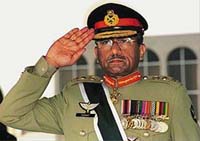Musharraf resigns to become civilian president of Pakistan

Pervez Musharraf has resigned as Pakistan’s military commander just to become a civilian president and defuse a dangerous political crisis.
Benazir Bhutto, a key opposition leader estranged by Musharraf's imposition of emergency rule, welcomed his belated retirement. But she said her party had yet to accept him as head of state.
Musharraf relinquished his post at a change of command ceremony in the garrison town of Rawalpindi near the capital, Islamabad, by handing over his ceremonial baton to his successor, Gen. Ashfaq Kayani.
"(You) are the saviors of Pakistan," Musharraf said in a final speech before an honor guard standing at attention in a field hockey stadium as hundreds of dignitaries sat in the stands.
Musharraf sniffed repeatedly, appeared to blink back tears and dabbed his nose after regaining his place alongside the taller, visibly more relaxed Kayani.
The end of Musharraf's nine-year control of the army has been a key demand also of Pakistan's international sponsors, who worry that opposition parties may boycott crucial January elections and further roil the country.
The U.S. and Britain, worried about Islamic terrorism emanating from Pakistan, welcomed the move but pressed Musharraf to quickly lift emergency rule, which he ascribed to rising Islamic militancy.
"The most stabilizing thing will be for Pakistan to have free and fair elections" and return to the democratic track Musharraf had taken, for instance by promoting press freedom, U.S. Secretary of State Condoleezza Rice said on ABC television.
"We understand the threat to Pakistan's peace and security, but I have urged President Musharraf to use the normal democratic process to respond," British Prime Minister Gordon Brown said.
Musharraf had retained his powerful army post since he seized power in a 1999 coup. He promised to give it up at the end of 2004 but broke his word, saying the country still needed his leadership.
He stepped down Wednesday only after steamrolling over opposition to him continuing as president.
The outgoing Parliament re-elected Musharraf in October. But the Supreme Court held up his confirmation following complaints that a military man could not constitutionally run for elected office.
Musharraf reacted by proclaiming a state of emergency on Nov. 3, firing the chief justice and other independent judges. Their pliant replacements approved his new mandate last week.
Officials have indicated that the emergency may be lifted soon after Musharraf takes the presidential oath on Thursday, but have not set a firm date.
During Wednesday's hour-long ceremony, a downcast-looking Musharraf, wearing a phalanx of medals and a green sash across his uniform, reviewed the ranks for the last time to the strains of "Auld Lang Syne."
"I'm proud of this army and I was lucky to have commanded the world's best army," Musharraf said. "I will no longer command ... but my heart and my mind will always be with you."
He paid tribute to Kayani, a former chief ofPakistan'sfeared ISI intelligence agency, saying he had known him since he was a colonel.
Kayani, 55, is expected to maintain Pakistan's effort against al-Qaida and Taliban militants.
Analysts say he may also focus on improving the ability of the army - set up for large-scale battles with India on the plains of Punjab - to carry out counterinsurgency operations.
He is also well-placed to heal the rift that has opened between Musharraf and Pakistan's civilian politicians. He served as Bhutto's military secretary in the late 1980s.
Musharraf's future is less clear.
He insists he must continue as president to guide Pakistan back to democracy.
But after more than 40 years in the army, he will have to jostle for power with Bhutto and Nawaz Sharif, another former prime minister newly returned from long exile.
Both are threatening to boycott the Jan. 8 parliamentary elections, saying it will be rigged to favor pro-Musharraf parties. However, they have also registered as candidates and say they will only shun the ballot if the entire opposition unites behind that drastic step.
Sharif, who arrived from Saudi Arabia on Sunday, has taken a particularly hard line against Musharraf, who ousted his second administration in the 1999 coup.
A conservative close to Pakistan's religious parties, Sharif is reaching out to the many voters who oppose Pakistan's front-line role against the Taliban and al-Qaida.
"Musharraf hasn't taken off his uniform under his own will, rather under pressure from the powers who installed him and kept him in power," Sharif spokesman Pervez Rasheed said in an apparent reference to the United States.
"Now the era of his unconstitutional and illegitimate acts will come to an end," Rasheed said.
Musharraf's declaration of emergency rule has also strained relations with Bhutto, who shares his secularist, pro-Western views and has left a door ajar for future cooperation.
"We welcome Musharraf's decision to shed the uniform. ... Now the Pakistani army has got a full-fledged chief and they can better perform their duties," she told reporters in Karachi.
However, she said her party will think over whether to accept Musharraf's new status as civilian president.
Musharraf has relaxed some aspects of the crackdown on dissent launched with emergency rule on Nov. 3. Thousands of opponents have been released and all but one news channel is back on air.
However, he has refused to reverse his purge of the judiciary, an act that deepened the animosity toward him from Pakistan's legal fraternity.
On Wednesday, about 400 lawyers staged a protest about 3 kilometers (2 miles) from army headquarters, shouting slogans including "We want freedom!" and "Hang Musharraf!"
"He should be thrown out," said Sardar Asmatullah, a leader of the city's lawyers' association. "He has been a dictator for the last eight years and he has delivered nothing good for this country."
Subscribe to Pravda.Ru Telegram channel, Facebook, RSS!




